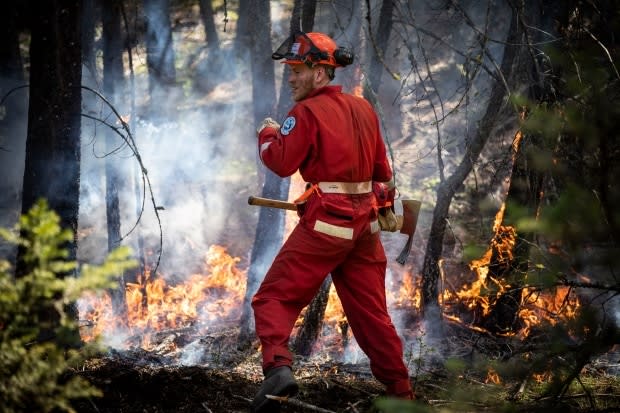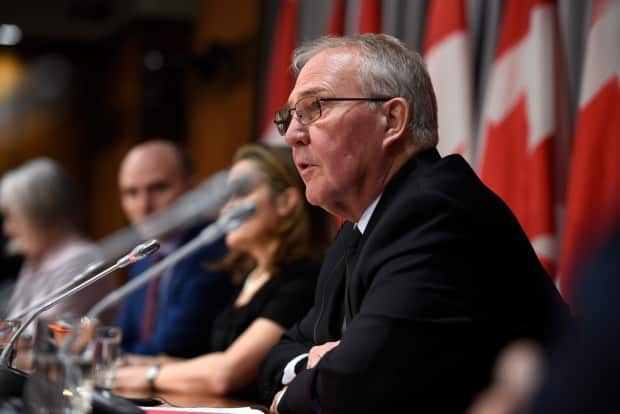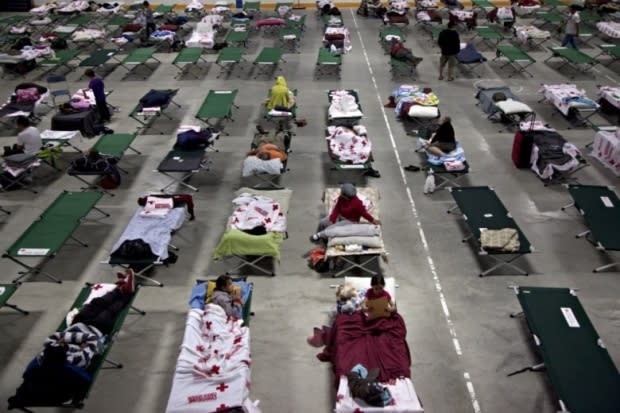COVID-19 adds extra anxiety as feds, provinces prepare for flood and wildfire season
Spring anxiety has become a part of life along the St. John River. For the past few years the river, which flows through New Brunswick's southwest quadrant, has flooded homes and roads, leaving destruction in its wake.
This year's flood season comes with an added problem: how do you fight rising waters alongside a rising COVID-19 caseload?
"It's a bit of an unwanted diversion," said Geoffrey Downey, spokesperson for the New Brunswick Emergency Measures Organization.
For flood watchers, April is a critical month, when a quick thaw and a period of heavy rain could mean the difference between saving a house and seeing it swallowed by the river.
Downey said it's still too early to know whether this spring will bring the sort of high water levels seen in 2017 and 2019, but the potential for widespread flooding exists.
"It's either going to melt slowly and it's not going to be a big deal, or it's going to melt quickly and then there's going to be rain and then everyone along the St. John River has a problem," he said.
On the other side of the country, Madeline Maley is getting updated forecasts for both flooding and wildfires.
The assistant deputy minister for Emergency Management British Columbia said reports show snowpack levels are "very high" in the interior. If that snow melts too quickly, downriver parts of the province could flood.
Some regions, including Okanagan-Similkameen, also saw periods of drought before the winter, but Maley won't know more about the wildfire outlook until the weather warms.
Updating emergency response plans
As they wait for more information, Maley's department and response crews are working pandemic prevention into their response plans.
"But still making sure staff are trained and located where they would normally be located across the province in preparation for the season," she said.
"People are working very hard. This is very different for us. We're thinking of lots of things that we hadn't dealt with before."

To reduce the risk of spreading COVID-19 while tackling evacuations, B.C. is working on ways to limit interactions between first responders and evacuees through virtual registration, reviewing how medical facilities will work and looking to adjust sandbagging procedures.
Maley said they're still trying to sort out how they'll house evacuees in the event that large numbers of people are forced from their homes.
"Some of the pieces we're just looking at now," she said. "The thing that comes to mind for evacuations is we have used hotels, so that's certainly an option."
Quebec has been particularly hard-hit by the highly contagious COVID-19 pandemic. It's also frequently battered by floods.
Quebec's Minister of Public Safety Geneviève Guilbault said she's already been on the phone with mayors and prefects in at-risk zones, warning them the government won't be opening service centres for disaster victims.
"This year, preparation is very different because of the COVID-19 pandemic and special measures are ... in place," she said in an email to CBC News.
"Our government asked them to be ready in the event of a flood and to also consider places to relocate their citizens, if some of them have to be evacuated due to the impossibility of housing people in emergency shelters, because we want to limit the spread of the virus."
So far, she said, all the municipal leaders understand what the provincial government is trying to do.
"I assured all of them that our government will be there for our citizens, no matter what happens."
No off-season for emergency responders
Even with the endless round of meetings on COVID-19 response, flood preparation continues. New Brunswick already has people out monitoring the rivers and the province has tasked an overnight duty officer to track flooding.
"There's no off-season for emergencies. It can be ice storms, it can be floods, it can be hurricanes, it can be tire fires. You have to be ready year round and you need to be properly staffed as well," said Downey. New Brunswick's flood preparation starts as soon as the previous year's last flood ends, he added.
This year's planning includes having contingency plans in place in case of illness related to the pandemic.
"One of the things you fear about something like COVID-19 is absenteeism — for example, a lot of people being sick at once," he said.
"Everyone has a replacement and the replacement has a replacement, and that replacement has a replacement."
The issue is seizing the attention of the federal government's emergency management wing, which has been holding meetings on how the federal government's response will have to be tweaked this year.
The federal Department of Public Safety declined a request for an interview on Friday but said it's "ready to co-ordinate our approach to any situation, at any time."
"Our government is committed to supporting the provinces and territories in the event of large-scale natural disasters, even through the unprecedented challenge of COVID-19," said Mary-Liz Power, a spokesperson for Minister Bill Blair.

The team is working on its risk assessment for possible spring flooding and wildfires, along with contingency plans.
"Working with the Public Health Agency of Canada, the government of Canada will work to adjust these plans as necessary to ensure both COVID-19 and the imminent flood and wildfire seasons are appropriately and robustly addressed," said Power.
Red Cross moves to 'virtual' response
The Red Cross already has moved to what it calls the "world of virtual response" and will weave those modified protocols if flooding displaces people across the country.
For example, last week the Red Cross was alerted to an apartment fire in Winnipeg. But instead of sending responders directly to the scene with blankets and food, the team found hotel rooms and arranged transportation from a distance.
Volunteers then walked the victims through the assessment process over the phone. It took longer than it would have in person, according to the Red Cross website, but it worked.
Downey said New Brunswick is lucky it hasn't had to rely on the Red Cross for emergency shelters, but he hopes that if people are displaced they'll keep physical distancing in mind.
"Most people along the St. John River are used to this. I guess it's comforting in a way. They know they get it bad, so they make arrangements in advance to stay somewhere else," he said.

"We hope that those who are making those kinds of early plans are thinking, 'Maybe all of us can't move into Uncle Dave's house this time around. Maybe, you know, one person will go here, one person will go there.' We're going to trust everyone to make responsible choices, as they usually do."
In past years, some provinces have leaned on the military as a last line of defence against swelling rivers.
The Canadian Armed Forces is already preparing itself for any COVID-19 demands.
Defence Minister Harjit Sajjan said Monday that the Canadian military will mobilize up to 24,000 full-time and part-time members to respond to calls from provinces and northern Indigenous communities for help with pandemic measures.
Department of National Defence spokesperson Jessica Lamirande said the department is watching the flooding situation across the country but won't know how many members will need to respond — if any — until it gets requests for assistance from the provinces.
Earlier this week, Chief of the Defence Staff Gen. Jonathan Vance said he's ready for multiple deployments across Canada.
"We're also looking at significant responses in the event that communities start to suffer multiple events, including floods, forest fires, inside a COVID environment where the Armed Forces will be able to put in place necessary support to critical infrastructure, logistics, as well as some medical support," said Vance earlier this week.
Despite the growing anxiety, Downey is confident New Brunswickers' grit will get them through.
"We have every confidence that New Brunswickers can rise to the occasion if they're asked to once again," he said.
"This isn't our first rodeo."


